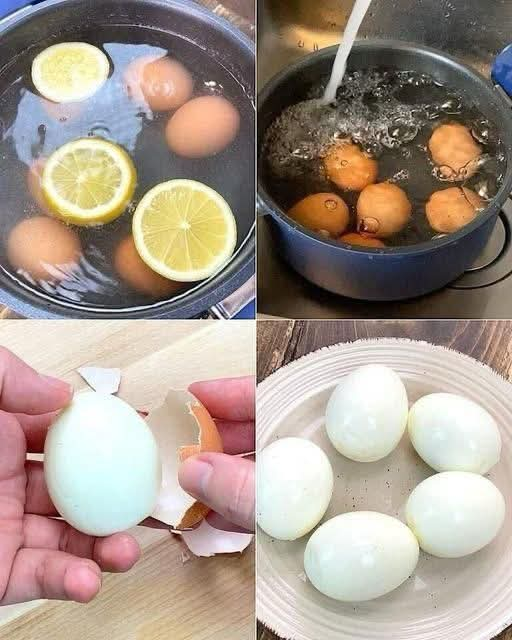Introduction:
Adding lemon juice to the water while boiling eggs is a simple yet effective kitchen hack that can help make peeling the eggs easier and also offer a subtle improvement in taste. The acidity from the lemon juice can help break down the eggshells, making it less likely for the shell to stick to the egg white. It’s a trick worth trying for those who struggle with peeling eggs after boiling them.
Ingredients:
Eggs (as many as desired)
1-2 tablespoons of lemon juice (freshly squeezed or bottled)
Water (enough to cover the eggs in the pot)
Instructions:
Place your eggs in a saucepan or pot in a single layer.
Fill the pot with enough water to completely cover the eggs by about an inch or two.
Add 1-2 tablespoons of lemon juice to the water. You can use freshly squeezed lemon juice or bottled lemon juice.
Bring the water to a boil over medium-high heat.
Once the water reaches a rolling boil, reduce the heat to low and let the eggs simmer for about 9-12 minutes, depending on how well-done you like your eggs.
After boiling, remove the eggs from the hot water and transfer them into a bowl of ice water to stop the cooking process. Let them sit for a few minutes.
Gently tap each egg on a hard surface to crack the shell and peel the eggs.
Description: This method of adding lemon juice while boiling eggs creates a slight acidity in the water. The acid helps to soften the egg’s outer membrane and prevent it from sticking to the eggshell, which often causes frustrating peeling. It’s a quick and efficient technique that minimizes the mess and time spent on peeling. Plus, the lemon juice might add a fresh, tangy taste to the eggs, which can be a pleasant surprise for those who enjoy a little citrus flavor.
Tips:
Use a little more lemon juice if you want an even more noticeable improvement in the ease of peeling.
Don’t add too much lemon juice, as it can alter the taste of the eggs. 1-2 tablespoons should suffice for a dozen eggs.
If you don’t have lemon juice, white vinegar is also an effective alternative for this method.
If you’re boiling multiple eggs, make sure they fit comfortably in a single layer in the pot to ensure even cooking.
Variations:
Vinegar substitution: Instead of lemon juice, you can add 1-2 tablespoons of white vinegar. Both lemon juice and vinegar have similar acidic properties that can help in peeling the eggs.
Seasoned water: To enhance flavor, add a pinch of salt along with the lemon juice for a bit of seasoning. Some people also like to add a small piece of onion or garlic to infuse a subtle flavor during the boiling process.
Soft-boiled eggs: If you prefer soft-boiled eggs, you can reduce the cooking time to 6-8 minutes after the water starts boiling, and lemon juice will still assist with peeling.
Correction: If the eggs are not peeling easily, try adjusting the cooking time, as overcooking can make the eggs harder to peel. Also, ensure that the eggs are transferred to ice water right after boiling; this rapid cooling will prevent them from continuing to cook and make the peeling process easier.
Enjoy: Enjoy your perfectly boiled eggs that are not only easy to peel but also have a refreshing hint of lemon flavor. Whether eaten on their own, in salads, or as a snack, they are a delicious addition to any meal!
